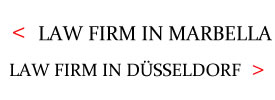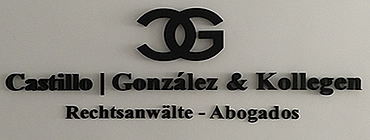- Düsseldorf
- |
- +49 (0) 211 - 163-751-76
- |
- CONTACT PER E-MAIL
- Marbella
- + 34 95 - 108-11-16
- |

- |

- |

Lawyer for Spain and German Enployment law
In the world of work there are often disputes between employees and employers, between the works council and the employer. Unlike in many other areas of law, labor law is not codified, that is, it is not contained in a single law, but is formed from many different laws that interlink. In addition to the BGB, the Federal Vacation Act, the Protection against Unfair dismissal and the Works Constitution Act, to name just a few, must also be taken into account here.
We represent you in dismissal protection processes against employees and advise you on the planned personnel restructuring of your company. We would also be happy to review the employment contracts you use. In Spanish employment law, we advise and represent you in despidos (dismissals) and contratos laborales (employment contracts) as well as in the area of ??personnel representation Spain, in particular the topics, Delegados de Empresa and Comite de Empresa (works council).
The law firm Castillo I González & Kollegen has committed itself to representing employers in the context of labor law. In Spanish employment law, we advise and represent you in despidos (dismissals) and contratos laborales (employment contracts) as well as in the area of ??personnel representation Spain, in particular the topics, Delegados de Empresa and Comite de Empresa (works council).
Employee representation in Spain:
Works council foundations:The representation of interests in Spanish companies (empresa) or companies (centro de trabajo) is divided between two different bodies. On the one hand, there is an operating committee (or personnel delegate) elected by the workforce, which is comparable to the German works council, but has no co-determination rights. On the other hand, every union within the company can form a union section. This cannot be compared to the German body of trust, as it has practically the same rights as the works committee. The Spanish Works Committee (comité de empresa), like the German works council, is an independent body that is independent of the unions and the employer and represents the collective interests of the workforce. The legal basis is the 1980 Statute for Workers (Estatuto de los Trabajadores, hereinafter referred to as ET). An operating committee can then be formed in all companies with 50 or more employees. According to Art. 63 Para. 2 ET, a joint operating committee can be formed if a company has two or more companies in the same province, each of which does not have 50 employees, but has a total of 50 employees in the province. Furthermore, Art. 63 para. 2 sentence 2 ET stipulates that in a province with companies that have 50 employees, but other companies cannot, the former can form their own operating committee, the second likewise. In smaller companies between six and 49 employees, personnel delegates (delegados de personal) are elected, who have the same rights as the company committee. The number of mandates and the scope of exemptions depend on the size of the company, as the following table shows:
| Employees: | Number of mandates: | Exemption claim per person: |
| 6-30 | 1 | 15 hours / month each |
| 31-49 | 3 | dto. |
| 50-100 | 5 | dto. |
| 101-250 | 9 | 20 hours per month |
| 251-500 | 13 | 30 hours per month |
| 501-750 | 17 | 35 hours per month |
| 751-1000 | 21 | 40 hours / month each |
Protection against dismissal:
All mandate holders enjoy protection against dismissal up to one year after leaving office. The competencias according to Art. 64 ET of the works committee are listed individually and casuistically, but do not go beyond information, advice and control. Neither the law nor the assigned dogmatics know full equal participation in the sense that the employer - as in $$ 87, 99 BetrVG - cannot act effectively without the works council. However, this does not mean anything about the factual possibilities of influence of the works committee, which with the strong support of a strong union can surpass that of a normal German works council. An example is the right to strike, which I will talk about in more detail later. It is not a prerogative of the unions, but a collective individual right. The main competencies of the operating committee are information and consultation. There is only a right of participation in the management of company social funds. The right to information relates to the general situation of the company, financial and balance sheet information, occupational safety and work environment, drafting of employment contracts and individual personnel measures (e.g. transportation or transfer). In addition, the works committee has the right to be heard in the event of profound changes in working conditions, relocation of parts of the company and mass layoffs. Pursuant to Art. 64 Para. 5 ET, the committee has the right to be heard, as far as the merger, takeover or change of the legal status of the company adversely affects the work volume of the company.
Depending on the situation, a consultation phase of 15 or 30 days is prescribed, after which the employer can implement his decisions unhindered. If the operating committee does not agree, it can initiate a collective conflict procedure (procedimiento de conflicto colectivo). This is a formalized conciliation procedure with the participation of the state labor inspection (inspección de trabajo), the result of which usually results in a company collective agreement. However, the works committee can declare a strike at any time - even during or after the conclusion of a collective conflict procedure - because the committee - unlike a German works council - decides for itself which concerns and interests should be enforced. In addition to the committee, a strike can also be decided by the staff meeting if at least 25% of the staff vote in favor. This can even happen against the express will of the committee. The union section can also declare a strike. In addition, it should be noted here that there is no peace obligation during the term of a collective agreement. The trade union section in the factories, at least equivalent to the works committee, is regulated by the 1985 law on freedom of trade union (Ley Orgónica de Libertad Sindical).
A company union section (sección sindical de empresa) can in principle be established in any company and by any union, but it only has special rights in companies with more than 250 employees. There, any union that has won at least one seat on the works committee can have union delegates elected from among its members. The employer has to grant them the same rights as the members of the works committee. The union delegates are not representatives of the workforce and, like German shop stewards, are only elected by the members of the respective union. Nevertheless, they are entitled to the same exemption as the members of the works committee. In summary, it can be said that the strength of the representation of interests in Spain can be seen more in the direct actions in the company. The right to strike should be emphasized here.
: Our law firm in Düsseldorf & Marbella represents you throughout Europe :
We also represent you with your concerns and interests in other European countries. Our qualified and competent advice and representation in Spanish and German law means for us that we as German lawyers and Spanish Abogados represent your concerns in Alicante. And always with the necessary persistence and the necessary specialist knowledge and competence. Simply contact us and simply describe your concerns or interests to us.







